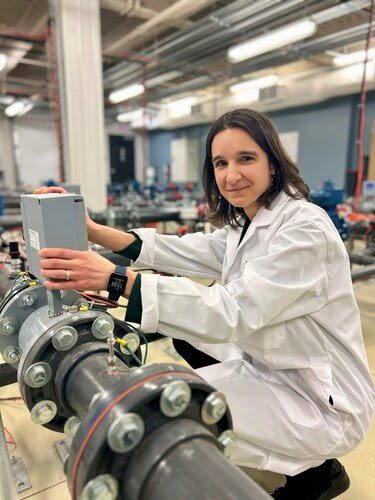QUEBEC CITY, QUEBEC – The Institut national de la recherche scientifique (INRS) and the Fédération québécoise des municipalités (FQM) have joined forces to develop sustainable water management solutions as part of the fight against climate change.
This new partnership has led to the creation of the Municipal Chair in Sustainable Water Management, supported by the Fédération québécoise des municipalités and headed by Sophie Duchesne, an INRS professor and expert in hydrology and urban infrastructure. The initiative is the only one of its kind in the field, as this is the FQM’s very first partnership with a research chair.
“This is something we’ve been seeing for several years now: climate change is making us rethink the management of both water and municipal infrastructure. Our new chair will be a springboard for building resilient communities that are better equipped to face these challenges,” stresses Professor Duchesne of the INRS Eau Terre Environnement Research Centre.
This research project by and for municipalities will support cities in areas like:
- Infrastructure sustainability and efficiency
- Sustainability of drinking water sources
- Water quality in the rivers on their territory
- Flood risk reduction
Municipalities, represented by the FQM, will be involved in the governance of the chair. This close collaboration will encourage scientific discoveries to be shared among all municipalities, preventing efforts from being duplicated and research from being done in silos. It will also anchor the research in municipalities’ real-life experiences and challenges.
“As climate change becomes more and more serious, Quebec’s municipalities are likely to face similar complex situations. As the voice of the more rural areas, the FQM is proud to support this chair, which will coordinate our actions and involvement in sound water management throughout all of Quebec,” states Louis-Georges Simard, Mayor of Rivière-Ouelle and a member of the FQM’s executive committee.
The next generation of scientists will also be an essential part of this partnership, which will support the training of future specialists in water management and make them aware of issues surrounding urbanization, land development, and climate change. These highly qualified personnel, equipped with a graduate-level education in water sciences, will also be able to meet the future human resources needs of Quebec municipalities.
“This innovative partnership with municipalities aligns perfectly with INRS’s mission: to provide research-backed answers to contemporary strategic issues,” says Isabelle Delisle, Interim Scientific Director of INRS. “Sustainable water management is one of these emerging priorities for Quebec society,” she concludes.









